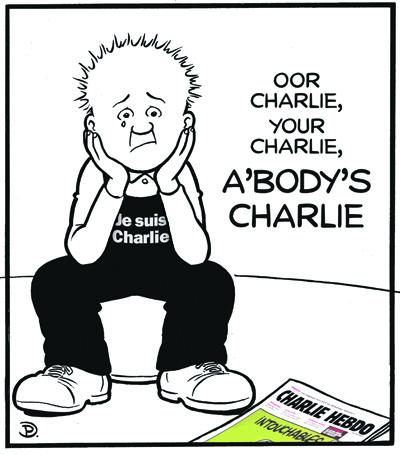http://www.slideshare.net/gyg66/the-structure-of-a-news-story
Intertextuality example – Oor Wullie tribute to Charlie Hebdo
Role of the Media question
http://www.thedrum.com/news/2014/10/17/social-media-more-influential-information-source-newspapers-scottish-independence
Mainstream media coverage assisted only 28 per cent of voters in Scotland when making a decision on the issues they considered most important in the Scottish independence referendum last month, according to YouGov research commissioned by News UK.
The figures showed that despite 71 per cent of respondents saying they had gathered general information on referendum issues from TV and radio and 60 per cent from newspapers and their websites, more than two thirds (68 per cent) of voters said that mainstream media coverage of the issues concerning them most in the referendum debate had not helped them reach a decision.
More than half of respondents (54 per cent) said they got general information on social media and other websites, and 44 per cent said they took information directly from the Yes and No campaigns.
However, when asked about information that did influence decisions, more people said they’d used information from social media and other websites (39 per cent) than newspapers (34 per cent), although TV and radio was the strongest source (42 per cent), and nearly a third (30 per cent) said they used information from the Yes and No campaigns when deciding how to vote.
The figures were unveiled by News UK chief executive Mike Darcey at Press Gazette’s News On The Move event in London on Thursday. The poll had 1,268 respondents.
Darcey said the referendum campaign highlighted the role newspapers play in political polls.
“A great example of how newspapers can really foster a debate is the recent independence referendum in Scotland,” he said.
“It was the Sunday Times poll, for better or worse, showing the Yes camp ahead, that threw the No campaign into turmoil and sparked an entirely new debate about the sort of powers that would be devolved if Scotland voted to retain the union.”
The Scottish independence referendum debate sparked media controversy when protests erupted outside the BBC’s Scotland HQ in Glasgow amid accusations from voters that there was a pro-union bias in mainstream media coverage.
Of the mainstream newspapers, weekly title the Sunday Herald was the only publication to back Yes, while the Scotsman and Guardian declared in favour of a No vote and the Scottish Sun and Daily Record did not take a stated position.
During the week of the referendum, The Drum investigated the rise of Scotland’s new media and spoke to the editors of alternative news websites Bella Caledonia, Newsnet Scotland and Wings Over Scotland, and gathered views from mainstream titles including the Sunday Herald, Scotsman and STV.
Thoughts?


